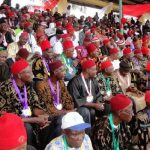
The non availability and high cost of environment-friendly sources of energy are among factors compelling Yobe state residents to devise other means for domestic energy that are detrimental to the environment.
Deforestation, one of the oldest human practices, remained a source of concern leading to many environmental challenges posing threats to the ecosystem in this part of the country.
This old human practice has negative implications on the environment as it causes soil erosion, loss of biodiversity in the ecosystem, loss of wildlife and increased desertification among other effects.
The effects of this practice have since started manifesting in many ways considering the depletion in the vegetation cover, hence placing the state among top states bedevilled by desert encroachment, erosion, soil infertility and other environmental challenges.
Environmentalists have established that every mature tree releases a considerable kilogram of oxygen and also absorbs certain amount of carbon dioxide from the air thereby purifying the atmosphere and enhancing the livelihood of man.
However, when these trees are indiscriminately fallen down, a gap in the production of natural oxygen is created with an increased quantity of carbon dioxide that floats the air.
An investigations conducted by DAILY POST showed that, in some filling stations where kerosene is available, a litre of the product is sold at the cost of N270 culminating to N1,350 per gallon, whereas in the black market, a litre goes for N300 which translates to N1,500 per gallon, hence its beyond the reach of the common man.
Liquefied Petroleum Gas (LPG), which should be cheap, accessible and available considering the huge deposit of the natural resources in Nigeria, can only be afforded by the middle class as 1kg is sold at the cost of =N=500 in the state, something which makes it in-affordable for low income earners who constitute a greater per cent of the population.
It should be noted that this high cost of energy plus poverty are factors making people in Yobe state to resort to buying firewood and charcoal which are relatively cheaper, available and accessible for domestic purposes.
When asked why they prefer firewood and charcoal instead of kerosene and LPG, Hannatu Inna, Aisha Mohammed and Saratu Audu, who are Damaturu-based roadside food vendors, replied that firewood is cheap and available.
They apparently cared less on whether their patronage of firewood is detrimental to the environment.
Apart from contributing to deforestation, the food vendors contribute to carbon emission thereby aggravating global warming.
A 58-year-old wood logger, Malam Usman Abubakar, when interviewed by our correspondent, said he has been in the business of felling trees for firewood for about five years now and use the money gain to carter for his family.
“I am not aware of any policy that says, if you cut one tree you are expected to plant five,” Abubakar stated.
Another middle-age wood logger, who wished his name not to be published, told DAILY POST, that poverty and lack of employment opportunity are the factors that compelled him to embark on such a dangerous adventure of felling down of trees for sale.
In Yobe state, there are hundreds of wood loggers like Malam Usman Abubakar, whose job for over the years is the selling of fire woods as means of their livelihood.
The Project Coordinator, Afforestation at the Yobe State Ministry of Environment, Bashir Lawan has lamented the high level of overgrazing and felling of trees for use as firewood, saying that these were practices popular in this part of the country, which are seriously taking a toll on the environment.
In a bid to reverse the trend, he said, “Yobe state government has initiated a programme whereby seedlings would be distributed to people free of charge particularly in areas where desertification has reached an alarming level as part of effort to inculcate the habit of tree planting in them.”
According to the Food and Agriculture Organisation’s (FAO) 2005, Nigeria is among countries with the highest rate of deforestation in the world.





